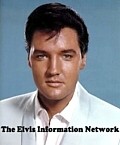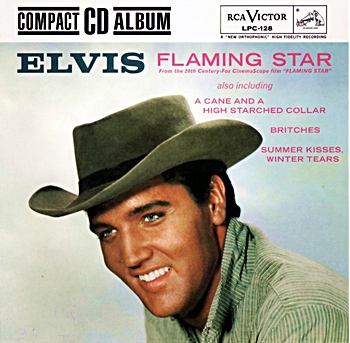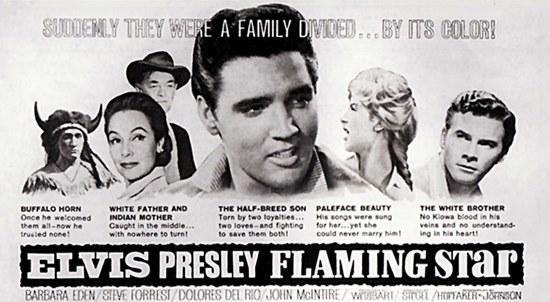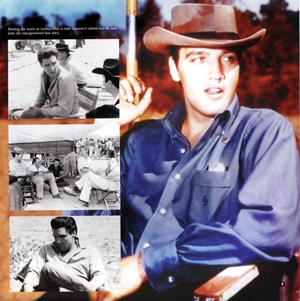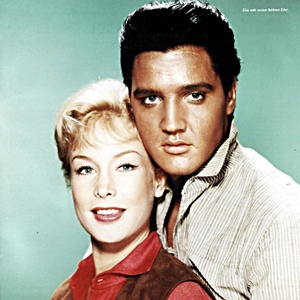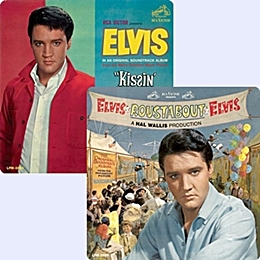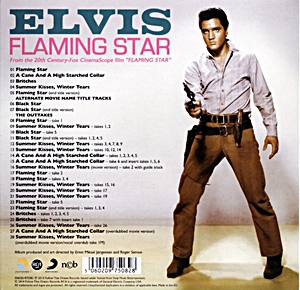In 1960 Elvis was enthusiastic about his chance to make a career as a serious actor and Flaming Star was a step away from the family fluff of ‘G.I. Blues’. So while the music was of little importance, Elvis was certainly enthusiastic about the film and FTD do a fine job with this "classic album" packaging and the 18-page booklet.
From a musical point of view there is little to get really excited about here since 13 of the unreleased takes are unfortunately from the woeful ‘Britches’ and ‘A Cane And A High Starched Collar’. There are however a few new takes of ‘Summer Kisses, Winter Tears’ and ‘Flaming Star’ to add to one’s enjoyment.
It was on August 1st 1960 that Elvis returned to Hollywood for pre-production on his sixth film, Flaming Star. As G.I. Blues would not be released until the end of the year Elvis must have hoped that the fluffy singing-travelogues were behind him and now, at last, he had a Western that would test his acting skills and give him another real chance to prove himself. |
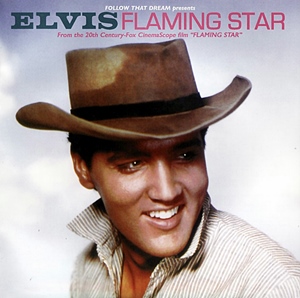 |
More importantly Elvis was truly back at the top when, in July 1960 ‘It’s Now Or Never’ was released becoming his biggest worldwide success since the original impact of ‘Hound Dog’ / ‘Don’t Be Cruel’.
Original chart releases
‘Elvis By Request - Flaming Star’ in the USA was a Compact 33rpm EP, a new format, released April 1961. It reached number 14 in the EP charts.
Songs featured on the EP were 'Flaming Star', 'Summer Kisses, Winter Tears' - with 'Are You Lonesome Tonight?' and 'It's Now Or Never' as filler.
Elsewhere the release was for more complicated!
The FTD cover is inspired by the original 'ELVIS By Request' EP that features "Flaming Star and 3 other Great Songs" !! Rather oddly the original sleeve is not shown anywhere in the booklet. |
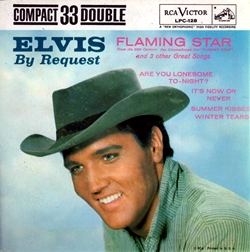 |
The Booklet.
Elvis looked great in this period, tanned and terrific, and the booklet features a nice selection of photos as well as the usual memorabilia.
The ‘Behind The Scenes’ section features the interesting debate about how – after the massive success of G.I.Blues - the songs might be released in various countries. Even Elvis added his thoughts..
... On February 25, at a press conference at Hotel Claridge in Memphis, Elvis was asked why the songs from Flaming Star were not released and answered: "I don't know. I think they felt it wasn't quite commercial enough to release. I don't know, really. It's left up to RCA Victor"
It also notes how Flaming Star would be banned in apartheid governed South Africa and other African countries. It is also hard to believe that several European countries gave the film an ‘Adults Only’ certificate. How things have changed!
Flaming Star was banned in apartheid-governed South Africa in the spring of 1961, as the mixed-marriage theme was considered to be in conflict with the country's strict racial separation laws. 20th Century- Fox appealed. As a result, the South African Board of Censors lifted the ban, on condition that it was shown to Europeans only. The film opened in Durban early in June 1961. However, it was permanently banned on cinemas in Kenya, Uganda and Tanzania, as colonial government officials were afraid the movie could reignite racial tensions in the aftermath of the bloody Mau-Mau rebellion.
In several Europe countries the film was given an 'adults only' certification and this prevented even more young Elvis fans from watching it."
There's also the technical interest of the EP being a “33 Compact” release, a format that was dropped soon after. This fact also helped stop the songs being released in the UK until 1965 on an LP. There's also the fascinating fact that Greece was the only country to release two songs as a single.
One page features Col Parker's Flaming Star campaign and ideas about “Novel Exploitation” to promote Elvis everywhere and they are quite hilarious. One idea is an Indian Party where hometown newspapers should plant suggestions that kids hold ‘Indian Costume Birthday Parties’ and take all their friends to the theatre to see Flaming Star. Parker really was an old carny!
The Music
On August 8th Elvis reported to Radio Recorders for the soundtrack session but this time without his regular group. While Dudley Brooks, Tiny Timbrell and The Jordanaires were present, there was no Scotty Moore or D.J. Fontana. This time Howard Roberts played guitar, Michael 'Myer' Rubin was on bass with Bernie Mattinson on drums. Jimmie Haskell would supply accordion to help enhance the movie’s western sound.
The four songs were supplied by the usual staff writers, Sid Wayne / Sherman Edwards, Ben Weisman / Fred Wise, Sid Tepper / Roy Bennett and there was nothing remotely challenging.
The CD starts with the four masters, plus the alternate ‘Black Star’ and the two end-title versions.
Audio Quality - The audio quality of the 'Black Star' session for some reason is not as good quality as the other tracks (presumably the original studio master tape has been lost) however it is now here as the clean tape without the added echo that was used on the earlier ‘Collectors Gold’ original release. 'Summer Kisses, Winter Tears' however is a lovely improvement on the ‘Collectors Gold’ original release and similarly the Lene Reidel mastered versions on 'Silver Screen Stereo' also had too much echo added to them. Again the tapes are presented as originally "dry" and without echo here.
The new Stereo outtakes have been remixed by Vic Anesini, the FTD mastered by Sebastian Jeansson - who both worked on the 'Complete Elvis Presley Masters' box-set. - Of course other tracks previously available on bootlegs sound far better here.
The selection of outtakes are sensibly separated, surely no one would want twenty-six attempts of ‘Summer Kisses, Winter Tears’ all in a row and luckily all seven torturous minutes of ‘Britches’ are easily skipped – you really only need to hear them once!
Looking closer at the outtakes..
Flaming Star: The outtakes kick off with the delightful (officially) unreleased Take 1 of Flaming Star, “OK gentlemen, here we go” says Elvis. It’s a lovely lightweight run-through, and listen out for Elvis clicking his fingers in the background keeping time. The initial takes are taken at a much faster tempo than the earlier recorded ‘Black Star’, but now the words "flaming star" fit the melody far better. The second take, now with added drum rim-shot during the choruses, is getting close to perfect.
Before Take 3 Elvis starts singing the lovely ‘Lonely Man’ to himself. This is quite extraordinary as Elvis would not be recording this song until a month later for his next movie! How fascinating that Elvis was already listening to potential songs for ‘Wild In The Country’ when pre-production had not even started.
At the end of Take 3 Elvis also delightfully sings, “too fast, much too fast” to the right melody. This is an absolute gem showing the enthusiasm and fun of the session.
On Take 4, now at a slower tempo, Thorny announces the title "Flaming Arrow", joking that he re-named the picture. This caused much amusement as Elvis then started to sing, "Everyone man has a flaming arrow". This time, just as the take ended, Elvis again broke up laughing ruining an otherwise fine version. You can hear him groan in the background in annoyance.
Take 5 is close but again Thorny asks for another take as it speeds up towards the end. Take 6 would be the master.
Flaming Star (End Title): In the same way that they had earlier recorded a slower-paced, shorter version of ‘Black Star’ for the film’s finale - another version of the new End title was needed.
Take 1 is so close to perfect that one cannot understand why more takes were needed. Again it only runs 40 seconds.
Unreleased Take 3 soon breaks down, while Elvis’ vocal is unsure at the beginning of Take 4.
The final master was a splice of Take 5 and Take 4. |
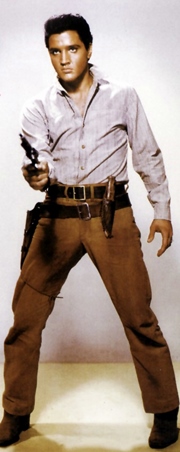 |
Summer Kisses, Winter Tears: Laughing at the start of session Elvis sounds in fine humour despite the quality of the material. The early takes feature a slower tempo and a lighter arrangement but with The Jordanaires annoyingly "oohing & ahhing" through the whole song. More of a run-though, the band mess-up the ending and Elvis asks afterwards, "Let us hear it back, Thorny".
Elvis becomes a little frustrated on the following and previously unreleased Takes 3 and 4, 7. Elvis suggests that Tiny Timbrell add a more cutting lead guitar but it ends up being too prominent and doesn’t sound right. At the end of Take 7 Elvis notes, “Bullshit”.
By Take 8 the tempo had been increased and the Indian-drum-pattern had been added making it sound drum heavy. On early takes the melody was driven by the prominent guitar. Elvis was right when he told the band, "Don’t get it too fast" adding, "Charlie was trying to bullshit me!"
By Take 10 a tambourine replaced the Indian-drums and the arrangement was at a better, slower tempo and with Tiny Timbrell’s guitar faded down, but once again everyone still sounded unsure of themselves.
Nothing had really changed by unreleased Takes 15 and 16. Sometimes it is incredible how long Elvis would work to try and perfect a lesser soundtrack song when “classics” such as ‘Return To Sender’ or ‘Reconsider Baby’ got knocked off in just one complete take!
By now the guitar line had been dropped being replaced by Dudley Brook’s delightful lead piano. There were another three more complete takes before Elvis managed a satisfactory Take 20.
Elvis however still thought it too fast and wanted another try. In annoyance Elvis starts mimicking speeded-up cartoon voices. Once again it is incredible how Elvis kept striving for perfection with such mundane material.
Not however included on this FTD release, some later takes are out on bootlegs. Take 21 would highlight Dudley Brooks’ piano lines but by now Elvis was losing inspiration. Right at the end of Take 23 he would break up, delightful laughing through the final lyrics. They would still keep going with the band often slipping off tempo.
Included here, the last take would be the final Take 26 - which by now had the Jordanaires adding the ludicrous “Bom, bom, bom, bom, bom” backing and which would also fail. At this point they gave up choosing earlier Take 20 as the master.
FTD however do include the ridiculous overdubbed movie version – with Indian tom-toms and solo Elvis vocal. No wonder it was removed from the film! The associated solo Elvis vocal overdub however is a real treat.
Black Star: As the original title theme, this was the very first song recorded at the session. When first released on Collectors Gold in 1991 this was a real surprise. Following the similar arrangement as the familiar ‘Flaming Star’, this was taken at a slower pace and with more of a "western" sound.
It would take 13 attempts to reach a satisfactory version and even then Elvis recorded an Insert ending that would be used as a splice to create the final master.
Here we only get the alternate Take 5 which although taken at a way too fast tempo is very close to the final master.
Black Star (End Title): A shorter version was needed for the film’s finale. Running only 40 seconds, this is at a slower pace and with an attractive acoustic arrangement. Jimmie Haskell on accordion helps create a country-camp-fire ambience. Here we get all five attempts although all of them are failed false starts except for Take 5 which is near perfect. Take 6 was the required master – again it was not used.
Britches: A ludicrous song for Elvis to be forced to sing, even if specifically written for the film by Sid Wayne / Sherman Edwards. If Elvis shouldn’t have sung the anachronistic ‘Poor Boy’ for Love Me Tender back in 1956, then the chart-topping star of August 1960 should have said a big NO to this hokey claptrap.
While a vocal overdub had been required to complete Jailhouse Rock’s ‘Baby, I Don’t Care’, this time Elvis truly didn’t care and wanted to record the song as a throwaway vocal overdub so as not to waste his time. Elvis of course regularly broke down laughing as he tried his best to sing the ridiculous lyrics, "Don't mess with a gal in britches, Yo-di-o-di-o."
On the final release it is obvious that Elvis was not singing in the studio with the band but was listening to a backing-track instead.
In the end they had to edit together two false starts plus an insert ending to create a less than 2-minute vocal overdub.
The outtakes are only notable for Elvis again singing Wild In The Country’s ‘Lonely Man’ to himself as he prepares for the worse!
The song would rightly not be released until after Elvis’ death on ‘A Legendary Performer Vol.3’ in 1978.
A Cane And A High Starched Collar: What on earth did Elvis do to deserve these appalling songs? Staff writers Sid Tepper / Roy Bennett can take the blame. Recorded as an old-fashioned square-dance this song however did make the movie’s final cut.
This time Elvis did actually record this with the band, Jimmie Haskell again supplying the old-time accordion vibe. However Elvis once again had trouble with the goofy lyrics causing him to break up with laughter. The first five takes including studio discussions are over in just over 4 1/2 minutes.
Elvis only managed one complete take and even then an insert was recorded to fix up the final few bars. Take 6 and band ending insert Take 6 would be spliced to create the master.
This first time Elvis would see the song released would be on RCA’s 1976 compilation ‘A Legendary Performer Vol.2’. I wonder what he thought!
Two pages from the FTD booklet
It is perhaps worth noting that with the title name change to Flaming Star a new session was needed and that Colonel Parker forced 20th Century Fox to pay an extra $5,000 for the new one song session since it was their fault the film’s title was changed. This crazy “Carny” Colonel Parker fact is however missed from the FTD booklet.
Overall Verdict: While this FTD soundtrack release has very little to work with basically only five songs, in the end it includes enough unreleased outtakes - providing a really good feel of the overall session - and ‘Behind The Scenes’ information to make it a worthy addition for any Elvis soundtrack collector. Elvis looked great in 1960 and this was a real chance for him to make a career as a serious actor. While the music is pretty lackluster this was a key point where Elvis' movie aspirations were extremely important to him. Had ‘G.I. Blues’ not conquered the market as a family entertainment blockbuster then Elvis’ film career may have been transformed, who knows possibly Oscar worthy.
-- -- -- -- -- -- --
Here are some additional comments from ‘Ultimate Elvis’ and not featured in the FTD booklet..
Flaming Star is certainly one of Elvis’ best films and impressed most of the discerning critics. The film’s public acceptance however was doomed when it was released in December 1960, only four weeks after the smash family-musical G.I. Blues. Worse than that, due to the impact of G.I. Blues, the publicity posters all showed Elvis with a guitar and some even stated, "Hear Elvis Sing, Flaming Star, Britches, Summer Kisses, Winter Tears, A Cane And A High Starched Collar" - publicity that was totally misleading. The posters should have said "See Elvis Act!" instead.
The film's director Don Siegel later commented, "The studio made a mistake. They should have used a campaign saying that Elvis emerged as an actor in the film. If they weren’t going to sell it properly they shouldn’t have released it."
Don Siegel also told Rolling Stone magazine, “I found Elvis sensitive and very good, with the exception that he was very unsure of himself. He felt he could have done better things. And his advisers, namely the Colonel, were very much against doing this kind of straight role. They tried to get him to sing throughout the picture. Obviously, they didn't want him to get off the winning horse. But when I was able to calm him down, I thought he gave a beautiful performance.”



